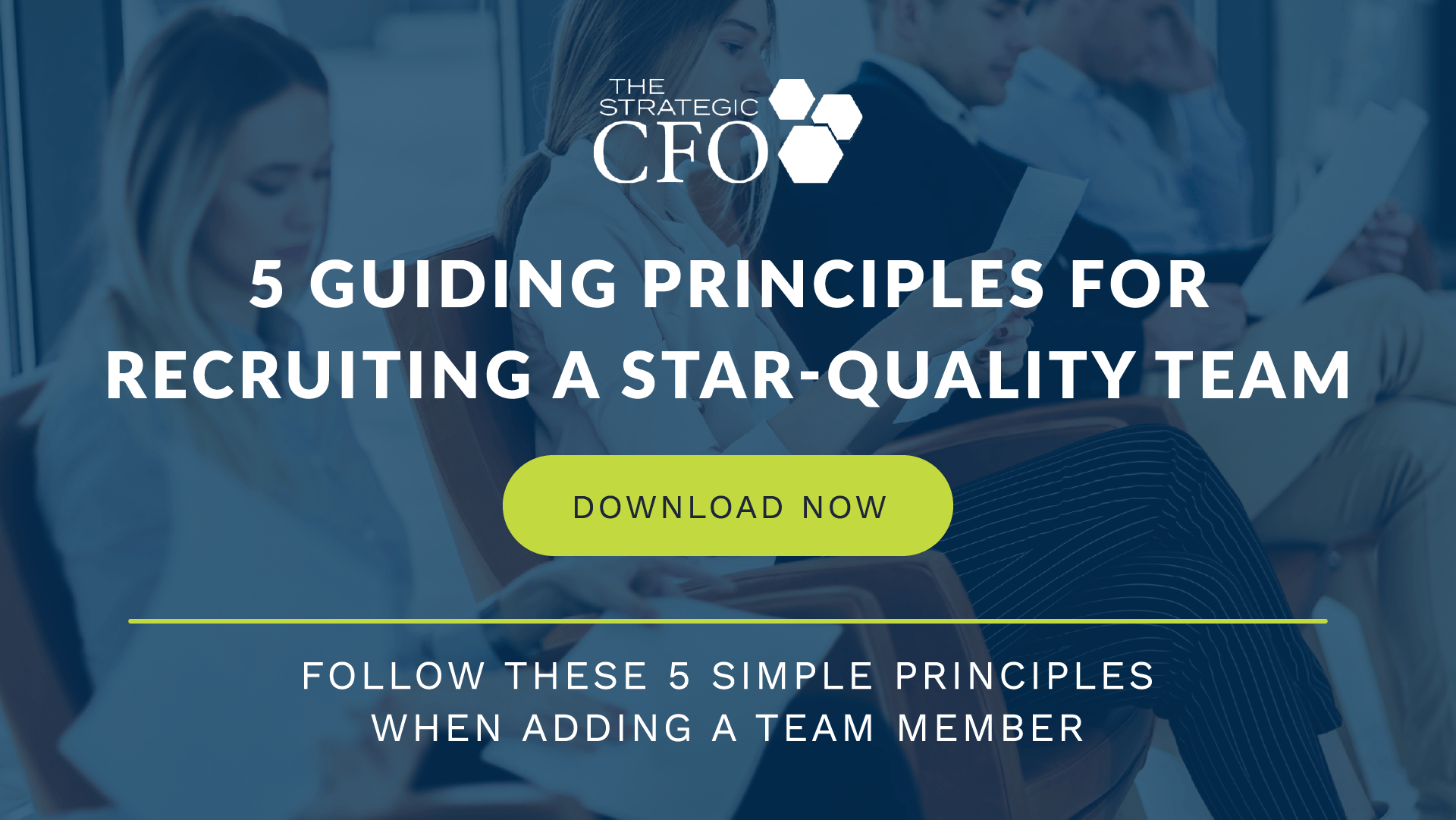Interns were once seen a free labor. Now, some internships get paid $50k + annually and get many perks of a full-time job (most common in public companies). The game has changed, so you need to change how you see interns. Over the past 6 years, The Strategic CFO has created a very successful internship program. As a result of our internship program, we’ve had interns go on to lead brands forward using their various skills. But we couldn’t have built a successful internship program without some guidelines. Today, we’re sharing those tips with you!
What is a Successful Internship Program? A successful internship program needs a firm willing to pour into the intern and an intern willing to learn and add value to the firm. It is a two way street after all! Before you start building it, you need to conduct a self-assessment on your needs and expectations.
[box] Interns can add real value to your company. If you’re ready to hire, then download our 5 Guiding Principles For Recruiting a Star-Quality Team! [/box]
Do a Self-Assessment on Your Internship Program
Before you start building an internship program, you need to ask yourself a couple questions. Call it a self-evaluation.
Needs Assessment
What are your particular areas of need? Do you need accounting, marketing, start up, strategy, website, finance, supply chain, etc. experience? Identify what type of experience and interest you want your intern to have. This first question also requires you to describe the projects you wish to accomplish during the internship. Do you need to add content to your website? Or put together a reporting package? Whatever it is, write it down. Then put a time commitment that you need in order to fulfill that project. It would be silly to expect a full time college student to work 40 hours a week. It’s just not possible; plus, you would be wasting your money as their productivity would be low. What time commitment do you expect from your intern? Think in the range of 10-30 hours per week.
Financial Compensation Assessment
How much are you willing to pay the intern per hour? Typically, we pay interns starting at $15/hour and potentially give raises depending on the length of their internship. Why do we pay them twice as much as minimum wage? You get what you pay for. Do you want someone who needs to make ends meet? Or do you want someone who wants to learn and jump start their career?
Time Commitment Assessment
Next, you need to identify what time commitment you can offer. While we’ll go into more detail about this later in the blog, you need to be able to commit several hours to your intern for training, mentoring, etc. That is one of the criteria for an internship.
How flexible are you? Many interns may need to work remote, travel, study, etc. This question will help you assess what type of person your looking for and what your expectations of them are.
Beyond the Internship Assessment
Is a permanent position available upon graduation? Evaluate what it would take for an intern to earn a full time position. Some companies may not even want to offer any full-time positions. And that’s okay! But you need to provide value to your interns while they are under your wing.
[box] Don’t just hire anyone to be your intern. You want interns that will add quality to your team. Download our 5 Guiding Principles For Recruiting a Star-Quality Team to start building your success internship program! [/box]
Creating Your Successful Internship Program
When you are creating your successful internship program, there are five steps that you must adhere to for it to be successful.
Internships Must Be Paid
Think about this… Would you add real value if you weren’t being paid? Probably Not. Over the years we have found that unpaid internships are not as successful as paid internships. The primary reason is one of commitment or lack thereof. In addition, it is difficult to hold someone accountable for performance and results if they are working for free. Conversely, if you are not paying me, I sometimes feel that anything I do is a favor. Consequently, we require that all internships must be paid ones.
Assign a Manager/Supervisor
Assign an employee of the company as a supervisor to the intern. In order to hold the intern accountable for results, they should report to one person. They can work for multiple individuals within the organization, but they must have a point person. The supervisor should make sure that they have plenty of projects in front of them, that they are keeping busy, and that the quality of the work is acceptable.
Project Based Work
The work assigned to the intern should be project based versus a part of the organization’s daily work flow. You need to keep in mind that the intern will eventually leave. Consequently, you don’t want to rely on that person on a daily basis. If it wasn’t the right fit but they have all the control, you will find yourself in a sticky situation. We cannot emphasize enough to keep project based work the focus of the internship.
Create a To Do List
You should develop a “to do list” over the course of the year of projects to be accomplished over the internship period. In addition, the projects should be finite. A beginning and ending date that spans the internship period. If you have a large project that goes longer, then just break it down into phases. A great way to structure your to-do list is to create an action plan. This may be the scope of the work you would like completed, much like hiring any other professional, you want to define the scope.
Finally, the projects should be meaningful to the organization. That means no copying or filing papers! The talents that the intern brings to the table are meaningful. Don’t waste their time or the company’s time doing work that doesn’t contribute to everyone’s success.
Start Hiring Your Interns
If you follow these four rules, then both the company and the intern should have a rewarding experience that leaves both parties with a sense of accomplishment. One question we get frequently is when to hire interns… The answer is now! It’s never too early or too late to hire your interns. In order to determine which candidates are the right fit for your company, download and access your free white paper, 5 Guiding Principles For Recruiting a Star-Quality Team. Start building your star-quality internship program!
[box]Strategic CFO Lab Member Extra
Access your Strategic Pricing Model Execution Plan in SCFO Lab. The step-by-step plan to set your prices to maximize profits.
Click here to learn more about SCFO Labs[/box]















